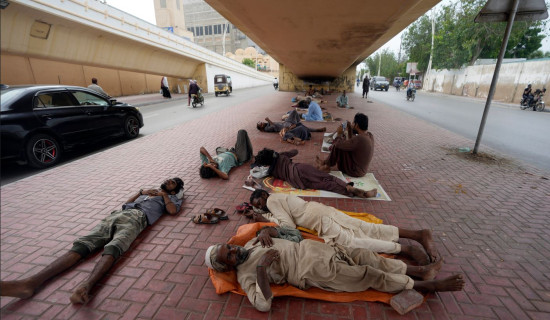- Saturday, 31 May 2025
Opposition criticises, private sector hails budget
By Pallav Bhusal,Kathmandu, May 30: Deputy Prime Minister and Minister for Finance, Bishnu Prasad Paudel, presented the annual estimate (Budget) of revenue and expenditure for the fiscal year 2025/26 in the joint session of the House of Representatives and the National Assembly on Thursday.
The budget outlines the government's fiscal priorities and sets the framework for national development in the coming year.
Talking to the media after the budget speech, DPM Paudel said that the budget was prepared within the nation's available resources and capabilities.
"This budget has been specifically designed to address and complete all outstanding projects. While challenges in budget implementation are not uncommon, we are confident that this time we will overcome them and ensure full execution," he said.
He further noted that the government has formulated the budget with a clear intention to encourage private sector’s investment by facilitating easier access to resources.
"A key feature of this budget is the prioritisation of resource efficiency eliminating unnecessary expenditures and ensuring proper and respectful use of available funds," he added.
Commenting on the budget, former Finance Minister Prakash Sharan Mahat expressed that the budget could have been more ambitious.
"In my view, the budget warranted a more thorough analysis. However, setting a minimum threshold of Rs. 30 million for new projects is a commendable initiative, and I believe it will yield positive outcomes," he said.
He said that the decision to reduce taxes and incentivise investment across various sectors is another encouraging feature of the budget.
"Overall, this year’s budget presents an optimistic outlook," he added.
However, opposition party leaders offered a contrasting view, expressing strong reservations about the budget’s priorities and its ability to address the country’s pressing economic challenges.
CPN (Maoist Centre) leader and former Finance Minister Janardan Sharma criticised the budget for failing to address the public’s growing frustration. Sharma argued that the new budget lacks focus on a production-oriented economy.
"Our economic development cannot be sustainable if we rely solely on customs duties and remittances," he said, emphasising the need for domestic production. He also criticised the lack of progress in health, education, and employment sectors. On infrastructure, he supported building airports with international investment, citing Nepal’s strategic advantage for aviation and economic growth.
Similarly, Vice Chairman of the Rastriya Swatantra Party, Swarnim Wagle, remarked that while the budget is presented annually, its implementation remains consistently incomplete. He noted that the new budget also appears impractical in terms of execution.
"We have repeatedly urged the government to heed the advice of our party’s experts, both within and outside the House.
I am confident that the government will once again fail to utilise the budget effectively, and the same patterns of past shortcomings will continue," Wagle added.
Industrialists outside valley have responded positively to the budget, describing it as industry-and business-friendly.
They welcomed the budget, noting that it attempts to address the concerns of small, medium, and large-scale industrialists alike.
According to our Butwal correspondent, Hari Prasad Aryal, President of the Butwal Industry and Commerce Association, said the budget offers overall relief to the industrial sector. He particularly welcomed the abolition of the Exim Code, calling it a significant step. Aryal also commended the budget for promoting regional balance, adding that it could be highly effective if implemented properly.
Former President of the Rupandehi Industry Association and industrialist Madhav Poudel also welcomed the budget, describing it as supportive of industry and business. He praised the exemption of registration fees for women entrepreneurs as a positive measure and echoed support for the removal of the Exim Code system at customs points. In addition, Poudel welcomed the abolition of tax on online payments.
Prem Bahadur Khadka, Chairman of the Small and Cottage Industries Committee of Sainamaina Municipality, said that the budget offers much-needed concessions to small-scale industrialists. He noted that the policy direction encourages the growth of cottage and small industries, adding that it has instilled hope of entrepreneurs in the sector.
Professor Madhav Poudel, who is also an economic analyst, said the budget appears balanced overall. "If political stability is maintained and the government that introduced the budget remains in place, there is reason to be optimistic about its implementation," he said.
















